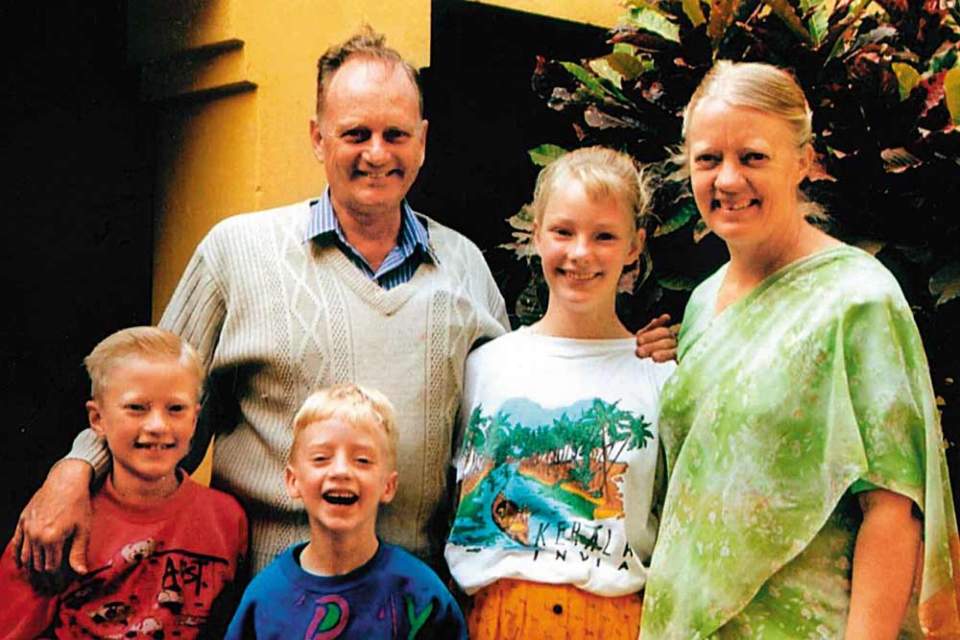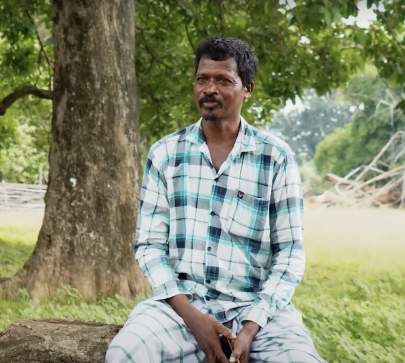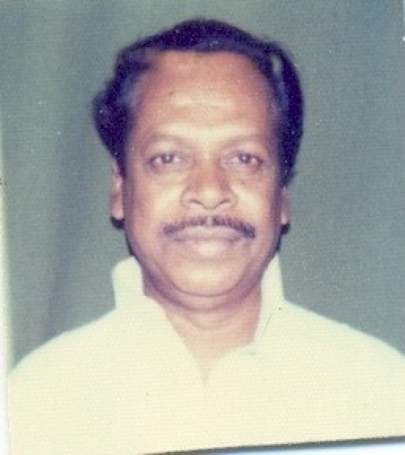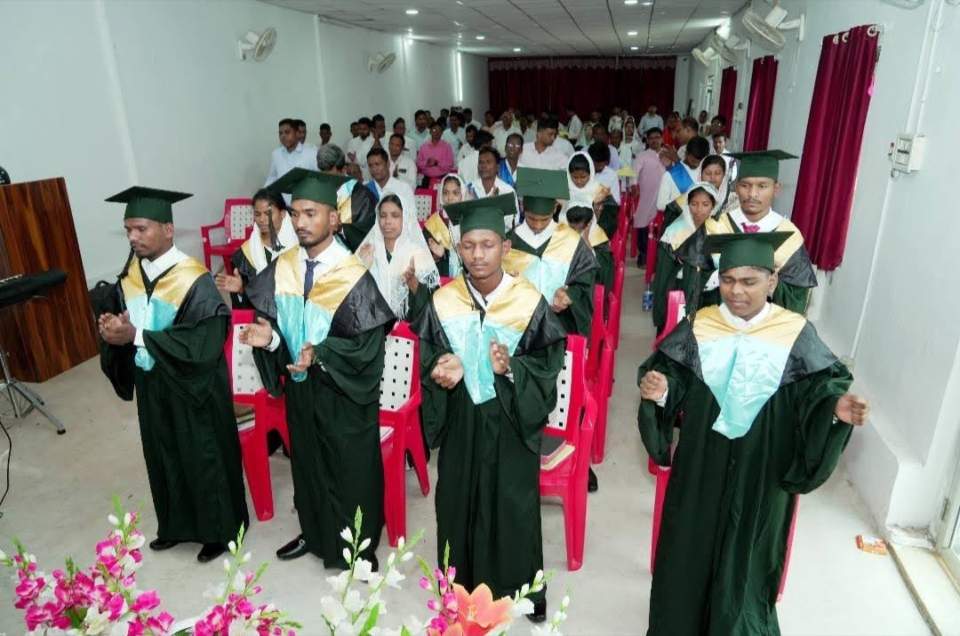Stephen the Martyr Lives Again Through Graham Staines

Praise God for His great grace, greater than all our sin, able to save even His most ardent enemies like He saved Saul of Tarsus.
The New Testament, written almost 2,000 years ago, continues to serve as a model for our own day. This is certainly true of Acts 7, which records the martyrdom of Stephen, a man sold out to Jesus Christ, fearless in life, fearless in death. The religious establishment feared and hated him.
The authorities arrested him and told him to give an account of himself. He did not flinch and spoke with authority, filled with the Holy Spirit. We are told his face shown with glory like an angel. His enemies could not stand the obvious contrast between him and themselves. These seemingly dignified and pious men “lost it,” dragged him outside and stoned him to death.
Even as the stones crushed him, Stephen maintained his calm, his eyes seeing the presence of the Lord of Glory Himself. In his dying breaths, he knelt in prayer and asked God, “Do not hold this sin against them” and “Receive my spirit.” His final words were like those of Jesus Himself as He gave up His
own life.
Luke tells us that Saul of Tarsus witnessed this scene. He was a young religious fanatic. Whether he helped to stir up the mob that murdered Stephen, we are not told. But we know from later passages that he approved what they did because he gladly persecuted as many believers as possible.
Stephen’s murder launched a massive persecution of the church in Jerusalem, forcing many to flee for their lives. Saul of Tarsus led the way. The early church appeared to be in retreat.
Yet Stephen’s forgiving and loving spirit, even in death opened the door for God to do above and beyond anything anyone could have imagined. The great theologian, Augustine, observed, “If Stephen had never prayed, Paul would have never preached.” That Paul was the same Saul of Tarsus who watched with satisfaction as Stephen “fell asleep” in death.
We come down to our own day…
Many of our readers will remember Graham Staines and his two sons, Philip and Timothy, aged 10 and 6, and their untimely martyrdom in early 1999. To refresh our memories of that event…
Graham Staines and his wife, Gladys, were missionaries from Queensland, Australia, who served as ambassadors for the gospel in Odisha. They spoke fluent Odia, the official language of Odisha. For 25 years, they were well-beloved among the people for their work, especially among lepers and the poor. Their effectiveness brought many people of Odisha to Christ. Every day, they trusted God to use them in bringing Jesus to the people.

They had three children, Esther, Philip and Timothy, all born in India and also well-immersed in the language and culture of Odisha.
The effective lives and work of the Staines family set up a dramatic contrast with the established Hindu leadership that did little or nothing to uplift poor people who lived in needless poverty and fatalism. Clearly, the corrupt government failed to develop their natural resources, and the Staines family made it show. Something had to give.
In January 1999, Graham Staines took a ministry trip to another village. It took place during a school break, and he was joined by Philip and Timothy. His wife and daughter decided not to accompany them.
On the way to their planned destination, they stopped along the way to rest for the night. They pulled off to the side of the road where they slept inside the car because of the cold outside. While they slept, they were surrounded by a mob of 50-60 men, armed with axes and other weapons of violence, shouting radical slogans and threatening to kill them for forcing people into a “foreign” religion.
Graham Staines and his sons tried to escape, but they were forced back into the vehicle while the frenzied mob poured gasoline on the vehicle and set it on fire. They continued to shout anti-Christian slogans and cheered as they watched Graham Staines and his two sons suffer in the flames and burn to death.
The murders horrified both Christians and non-Christians alike. They were widely condemned for killing a man and his sons for doing only good. Human Rights Watch accused the Indian government of failing to protect Christians and using religious tensions to further their agendas. At that time, the Indian federal government was under control of the BJP. Various participants of the mob were rounded up, tried and jailed.
Gladys Staines astounded the world when she publicly announced that she had forgiven those people involved in the slaying of her husband and children. At that time, she said, “It is far from my mind to punish the persons who were responsible for the death of my husband Graham and my two children. But it is my desire and hope that they would repent and be reformed.”
Then with prophetic insight, she said, “With forgiveness comes healing.”
One of the young men who carried an axe that night, screamed anti-Christian epithets and cheered as Graham Staines and his two sons burned to death was a teenager named Chengu Hansdah. He was one of those identified and arrested for his part in the murder of Graham, Philip and Timothy Staines. He was one of those whom Gladys Staines forgave.

A few years after the Staines murders, in 2008, massive persecution of Christians took place in Khandamal district, also in Odisha In a population of 600,000, almost 150,000 people were Christians—one of the highest concentrations in the state. This was a very volatile region. Most of these Christians are tribal and Dalit (formerly known as untouchables). Their Christian faith has broken the lie that they are inferior to others of higher caste background.
This high percentage of Christians aroused resentment and tension especially among those of higher castes. They saw conversion of “lower class” people and their growing sense of self-worth as a breakdown of society. Major leaders masterminded a plot that inflamed Hindu extremists to burn thousands of homes and hundreds of churches and turned tens of thousands of Christians into refugees.
Thousands took shelter in the jungles fearing attacks from the radicals. The government of the neighboring state of Chhattisgarh sent in militants against Christians in Odisha. It is also suspected that radicals came from Gujarat, Madhya Pradesh, Karnataka and Maharashtra.
In the aftermath of these attacks, India Bible College and Seminary saw an increase in enrollments of young men and women from Khandamal district in Odisha who personally experienced the persecution and also sensed that God was calling them into ministry.
One of the major planners and instigators of the violent killing and persecution of Christians in Khandamal district was Nagarjuna Pradhan, a 20-year member of the Odisha Legislative Assembly. He was also a long-time member and leader of radical Hindu organizations and involved in the burning of many churches going back to the 1980s.

Since those days, Chengu Hansdah and Nagarjuna Pradhan have become believers in Jesus Christ.
After spending nine years in prison, Chengu Hansdah was released for good behavior, but he said he found no peace after his release. He insists that his commitment to Christ was influenced in no way by any clergy or outside pressure by other Christians. Instead, Hansdah, now 39, says, his change resulted from personal grief and long periods of introspection. During this time, he experienced the deaths of his first wife, all of his sisters and many other family members.
A powerful and compelling inner voice (the Holy Spirit) followed him day and night and told him he must renounce his violent ways if he was ever to know peace again. That strong inner voice compelled him to finally return to the scene of his crime and to the people he harmed because he participated in the murder of the one man and his family who helped them most.
He took this difficult step and repented publicly to the Christians of that area and asked their forgiveness. Only then did he experience inner peace. He now realized he was one of them.
“I am happy now to be a Christian,” he says. “The Bajrang Dal [radicals with whom he associated] do not know what they are doing. There is no forceful conversion.”

Presently, we have less information available to us about Nagarjuna Pradhan’s journey to Christ, but we have this word on both men from a member of India’s secular press. The fact that this reporter is not himself a believing Christian lends even greater credence to his report.
The spirit of the martyred Stephen lives in our own day through the witness of Graham Staines and his family and in the transformed lives of Chengu Hansdah and Nagarjuna Pradhan.
Pray that the deaths of these three followers of Jesus and the grief and prayers of forgiveness from their wife and mother produce many more Sauls of Tarsus for this generation and beyond.
Pray that God will honor the deaths and losses of Odisha’s Christians by bringing increasing numbers of Damascus Road experiences to their persecutors.







Sincerely. Peter Maher Tuesday, September 30, 2025
What an astounding miracle. God is still on the throne!
I remember praying for Gladys and Esther, and the radical murderers to come to Christ.
This is wonderful news and very moving.
God is so loving!
Holy Spirit pursues this chosen ones, no matter how much they resist.
May multitudes come into the Kingdom through what has happened.
Thankyou for sharing this.
Thursday, October 9, 2025